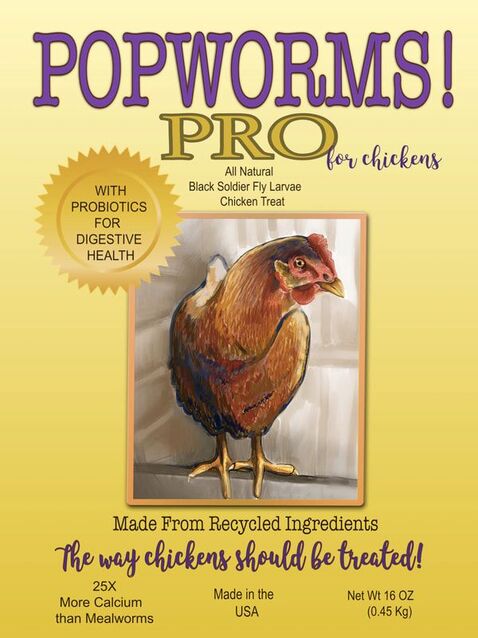|
Just like our digestive tract, that of the chicken is lined with trillions of tiny bacteria. Most of these bacteria are good, keep the digestive tract (and rest of the body) healthy, and even help with digestion. One way to keep the digestive tract of a chicken happy and functioning properly is to create a balanced environment of bacteria. We can help with this process by supplying our chicken friends with more beneficial bacteria, called probiotics. Probiotics are live bacteria that are added to an animal’s diet, they line the digestive tract and interact directly with the chicken’s own cells to help food digestion and promote immunity. Probiotics have also been considered as good alternatives to treating animals with antibiotics. Although it is not completely understood how these bacteria promote health, the use of these beneficial bacteria in both humans and farm animals is an area of intensive research.
Choosing the Right Probiotic Choosing the right probiotic is very important, as some that may be good for humans may not be good for chickens. It is important to do your research for studies showing positive (and negative) effects of probiotics on chicken health. One probiotic that has received a lot of attention for its positive impact on chicken health is Lactobacillus acidophilus. This is a Gram-positive bacterium that does not cause disease, and actually has been shown to reduce disease-causing bacteria! Below are some summaries of research using L. acidophilus to promote chicken health and performance. Effects on Feed Intake and Growth Performance One study on supplementing chicken diets with L. acidophilus showed a significant beneficial effect on body weight gain between 15–28 d and improved feed conversion rate in the overall period. Along with this, litter moisture and pH were not impacted. The researchers found a significant difference in decrease of potentially harmful bacteria, results that were attributed to the improvement of the intestinal microbial balance by competitive exclusion (crowding out the harmful bacteria). Another study showed similar results, with better feed conversion ratios. Broiler meat quality has also benefited from probiotic supplementation. Effects on Egg Production and Quality Probiotics such as L. acidophilus added to diet improved daily egg production in hens, and some studies showed direct increases in egg production that also corresponded to increases in daily probiotic supplementation. While I could not find any studies showing differences in egg shell hardness with probiotic supplementation, one study showed higher egg weight from Lactobacillus fed hens. Others have also shown decreases in egg yolk cholesterol, presumably due to the ability of L. acidophilus to absorb cholesterol. Pathogen Reduction The use of probiotics has been shown to improve natural defenses against pathogenic bacteria. Studies have shown that L. acidophilus and other probiotics can inhibit the growth of Campylobacter jejuni, an important source of intestinal illness in humans. Another important finding was that newly hatched chickens could be protected against infection by Salmonella enteritidis. In addition to this, L. acidophilus increases antibody production against viruses such as the one causing Newcastle disease, a devastating respiratory disease, that also leads to depression, nervous manifestations, or diarrhea in the chickens. The positive effects of L. acidophilus encompass more than I can include here, such as reducing diarrhea and smelly feces, and these bacteria also aid in suppressing pest flies…just to name a few! One way to add these beneficial bacteria to your flock’s diet is with PopWorms! PRO. Chickens love these black soldier fly treats, and each bag is packed with L. acidophilus that delivers natural nutrition! To help us celebrate the launch of this new product, use the coupon code PRO for $2.00 off each bag of PopWorms! PRO you buy (valid through 7/7/2019). Check them out today!
1 Comment
|
PopWorms!®
|
|
Site Map
|
Products
Dry Products
PopWorms!® ECO Popworms!® ECO Bulk PopWorms!® PRO Live Products PopWorms!® LIVE PopWorms!® Leftovers |
Shipping
Site-wide
Free Shipping Over $25 |

 RSS Feed
RSS Feed


